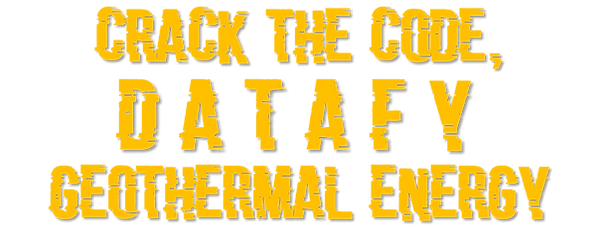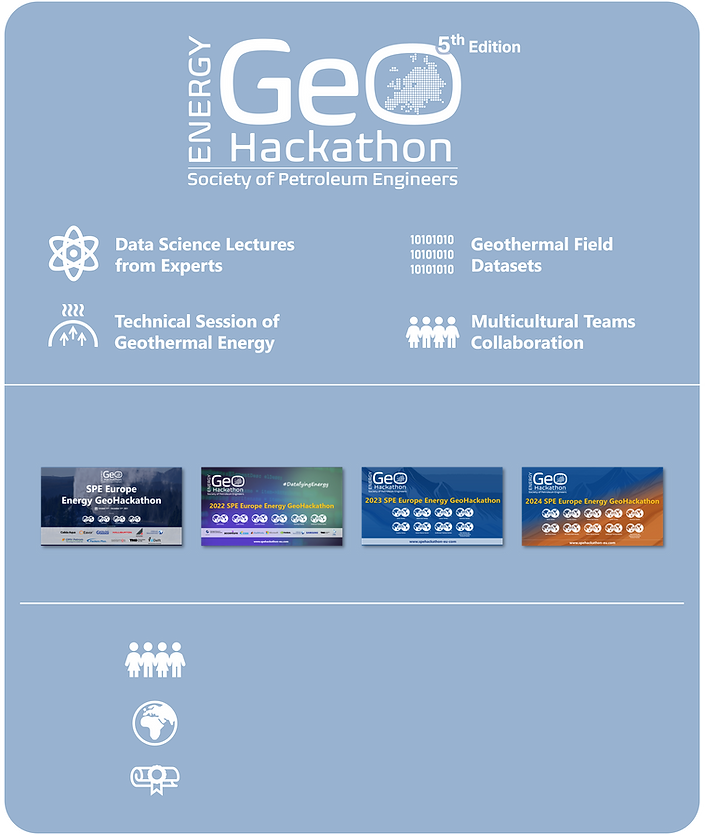
2025 SPE Europe
Energy GeoHackathon
⭐ 5th Edition ⭐


Our Sponsors and Partners:
Is your Company interested to support the organization and delivery of the 2025 SPE Europe Energy GeoHackathon? Click HERE



The Energy GeoHackathon
The SPE Europe Energy GeoHackathon aims at educating and disseminating knowledge to all the participants on how Data Science applications can support Geothermal Energy Developments and drive the Energy Transition.
The event is organized by a diverse team of volunteers from different SPE Sections in Europe and from International Technical Sections moved by the desire to “make the Energy Transition happen” in a datafied and sustainable way.
Registration
A formal registration and the payment of a ticket is required to participate to SPE Europe Energy GEOHackathon.
Bootcamps (1st October 2025 - 30th October 2025)
A four-week bootcamp sessions on Data Science & AI and Geothermal Energy will begin on the 1st October 2025. Data Scientists and industry experts will deliver weekly sessions to equip participants with the relevant technical knowledge to understand the challenge and be ready for the Hackathon.
▪ Non-SPE Members: €35
▪ SPE Members & Geothermal Professionals : €25
▪ SPE Students, Unemployed, Retired : €10
▪ Financial Sponsors (Employees): Free
NOTES:
-
SPE MEMBERS (comprehending Unemployed & Retired) must specify their Section of belonging & Member ID to be able to purchase a ticket for €25
-
GEOTHERMAL PROFESSIONALS must register using their Corporate email address to be able to purchase tickets for €25
-
SPE STUDENTS must specify their Student Chapter & Member ID, and register using their University email address to be able to purchase tickets for €10 - requests for registration sent not using Universities' email accounts will not be considered.
-
FINANCIAL SPONSORS' EMPLOYEES must send and email with object "SPONSOR EMPLOYEE REGISTRATION" using their Corporate email address to spe.energygeohackathon@gmail.com - requests for registration sent not using Sponsors' email accounts will not be considered.
Hackathon (Final Submission: 30th November 2025)
Collaborations
Please, click on the button below if your and your company want to collaborate with us on the delivery of SPE Europe Energy GeoHackathon. One of our team members will contact you as soon as possible to discuss together the best way to take part to the initiative.
All the employees working for a company supporting the event will have free access to both bootcamps and hackathon competition.
CHALLENGE
Well reports and technical documents contain valuable information, such as well trajectory, well completion diagram, together with PVT report (fluid properties) and equipment specs that can be used for critical tasks like well integrity assessment or modelling wellbore performance for production and injection assessment.
The challenge is to build and develop an agentic AI workflow that can automatically retrieve relevant information from well reports and documents, connecting to a wellbore flow model to perform nodal analysis calculations and estimate the potential production rates from the wells. The agent should have the capability to validate and perform sanity-checking of the extracted data (e.g. check measure depth > true vertical depth, realistic tubing and casing diameters) and interact with the user in terms of missing or ambiguous inputs.
The challenge is divided into a number of sub-challenges of increasing difficulty. Each sub-challenge is scored separately from the others such you can still score points on one sub-challenge even if the results from the previous sub-challenge were not satisfactory (see the “scoring criteria” section for more details on this). In addition, extra points can be earned by completing an optional bonus sub-challenges at the end.
The main sub-challenges are as follows:
-
Create a retrieval-augmented generation (RAG) workflow that can create an accurate and complete summary of a (completion) report within a given amount of words based on a user prompt.
-
Using the same RAG workflow, accurately retrieve parameters and data required for the estimate wellbore production capacity by performing of nodal analysis calculations from tables and/or text.
-
Connect the RAG system to an agentic workflow that can automatically extract the parameters in sub-challenge 2, perform the nodal analysis calculations and return the correct results in an accurate and understandable response to the user.
The bonus challenge is:
-
Use a vision model to extract the nodal analysis inputs from images instead of tables or text.
DATA
The Dutch Oil & Gas Portal (www.nlog.nl) contains a large collection of open access data on Dutch wells, including well and drilling reports.
To help them develop and test their workflows, participants will be provided with a number of these reports from which to extract relevant information and parameters to perform subsequent calculations with. This includes recent documents as well as more challenging older ones that might be more difficult to process. During final scoring, a new set of unseen reports will be used to evaluate the developed workflows with.

Insights on the first 4 editions of the SPE Europe Energy GeoHackathon

Participants attending all the Bootcamps sessions AND completing the Hackathon challenge will be awarded with a Digital Certificate of Training issued by SPE and sharable on LinkedIn

Our Goal is to move from 'talking' about Energy Transition to 'educating' and 'making it happen'
in a datafied and sustainable way

MODEL
All participants will be provided with the same nodal analysis model and a list of required inputs and parameters needed to run it. Participants are not allowed to alter the model or the format through which it receives its inputs or returns its outputs. Participants will be provided with the models from the GEMINI Digital Twin platform developed by TNO.
CONSTRAINTS
All developed code will be run by a jury on windows computers with 8 CPU cores, 16 GB of RAM, and an AMD Ryzen 7 PRO 475U 1.7 GHz processor. Solutions should not rely on a GPU in order to be able to run.
All workflows should be coded in Python. Participants are allowed to use any packages they like as long as they can be easily and freely installed through pip. Participants should provide a list of requirements with which a new environment can be installed that allows all developed code to be run without issue.
Code should be well structured with comments of sufficient quality such that it is understandable without additional explanation by the participant.
Participants are free to use any available open-source LLM (preferably using Ollama platform, but not limited to), computer vision (e.g. Optical Character Recognition, aka OCR) or agent workflow, provided it is freely available and can run on a computer with the specifications as listed above.
650+ Participants
40+ Countries
80+ hrs of Certified Training



















